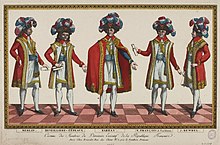Coup of 18 Fructidor
| Coup of 18 Fructidor | |||||||
|---|---|---|---|---|---|---|---|
| Part of theFrench Revolution | |||||||
 Acting for the coup's leaders, GeneralPierre Augereaustormed theTuileries Palaceto arrestCharles Pichegruand others accused of plotting a counter-revolution. | |||||||
| |||||||
| Belligerents | |||||||
| French Directory |
Royalists in the Council of Ancients and the Council of Five Hundred | ||||||
| Commanders and leaders | |||||||
|
Political: Military: Pierre Augereau Lazare Hoche |
François-Marie Barthélemy Charles Pichegru François Barbé-Marbois[1] | ||||||
| Strength | |||||||
| 30,000 soldiers[1] | 216 royalist deputies[citation needed] | ||||||
| Casualties and losses | |||||||
| |||||||
TheCoup of 18Fructidor,Year V (4 September 1797 in theFrench Republican Calendar), was a seizure of power in France by members of theDirectory,the government of theFrench First Republic,with support from the French military.[2]The coup was provoked by the results of elections held months earlier, which had given the majority of seats in the country'sCorps législatif(Legislative body) toroyalistcandidates, threatening a restoration of themonarchyand a return to theancien régime.[3]Three of the five members of the Directory,Paul Barras,Jean-François RewbellandLouis Marie de La Révellière-Lépeaux,with support of foreign ministerCharles Maurice de Talleyrand-Périgord,[4]staged thecoup d'étatthat annulled many of the previous election's results and ousted the monarchists from the legislature.[5]
History[edit]
Royalist candidates had gained 87 seats in the1795 elections,where a third of the seats were at stake. A reversal of the majority in favor of royalists and moderate republicans in the two legislatures, theCouncil of Five Hundredand theCouncil of the Ancients,took place in theelections of April 1797.[1]Soon the new majority repealed laws against priests who did not take the oath of theCivil Constitution of the Clergyandemigrés,and demanded the removal of fourJacobingovernment ministers from office.[1]
Under the royalist majority, theMarquess of Barthélemy,a known monarchist, was elected member of the Directory by the chambers, in replacement of the leaving directorLetourneur.François Barbé-Marboiswas elected president of the Council of the Ancients,[1]andJean-Charles Pichegru,a figure widely assumed to be a sympathetic to the monarchy and its restoration, was elected President of the Council of Five Hundred.[2]After documentation of Pichegru's treasonous activities was supplied by GeneralNapoleon Bonaparte,the republican Directors accused the entire body of plotting against the Republic and moved quickly to annul the elections and arrest the royalists.[2]
At dawn 4 September 1797, Paris was declared to be under martial law, while a decree was issued, asserting that anyone supporting royalism or the restoration of the Constitution of 1793 was to be shot without trial.[citation needed]To support the coup, GeneralLazare Hoche,then commander of theArmy of Sambre-et-Meuse,arrived inthe capitalwith his troops, while Bonaparte sent troops underPierre Augereau.[3]Pichegru,Dominique-Vincent Ramel-Nogaret,Barthélemy andAmédée Willotwere arrested, whileLazare Carnotmade good his escape. 214 deputies were arrested and 65 were subsequently exiled toCayennein French Guiana including Pichegru, Ramel, Barthélemy and Carnot. The election results in 49departmentswere annulled. In the aftermath 160 recently returnedémigréswere sentenced to death, and around 1320 priests accused of "conspiring against the Republic" were deported.[1]The two newly vacant places in the Directory were filled byPhilippe Merlin de DouaiandFrançois de Neufchâteau.[4]

The 80-gunship of the lineFoudroyantwas briefly namedDix-huit fructidorin honour of the event.
References[edit]
- ^abcdef"coup d'État du 18 fructidor an V".Larousse(in French).Retrieved11 June2021.
- ^abcDoyle, William(2002).The Oxford History of the French Revolution.Oxford: Oxford University Press. p.330.ISBN978-0-19-925298-5.
- ^abManière, Fabienne."4 septembre 1797 - Coup d'État de Fructidor".Horodote(in French).Retrieved11 June2021.
- ^abBernard, pp. 193–194.
- ^Hall Stewart, John (1951).A Documentary Survey of the French Revolution (adapted).New York:Macmillan.
- Bernard, J.F. (1973).Talleyrand: A Biography.New York: Putnam.ISBN0-399-11022-4.
